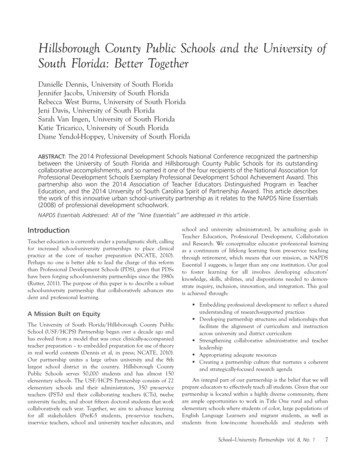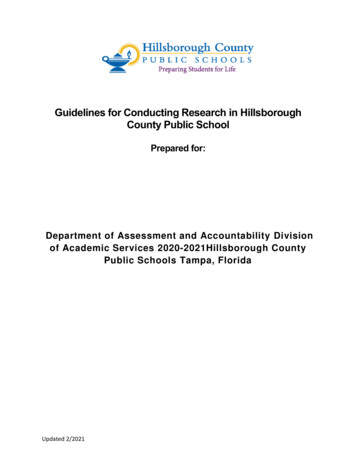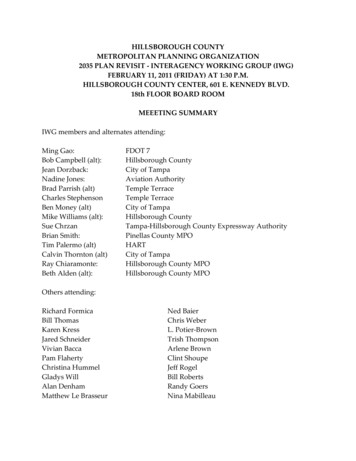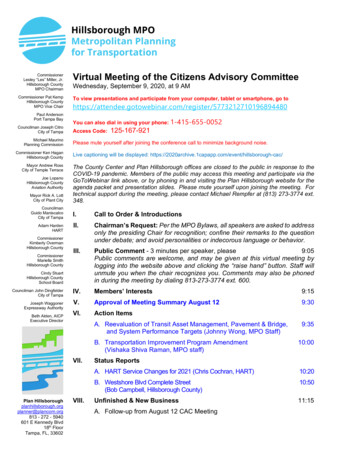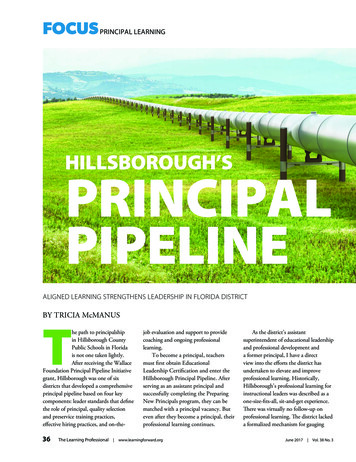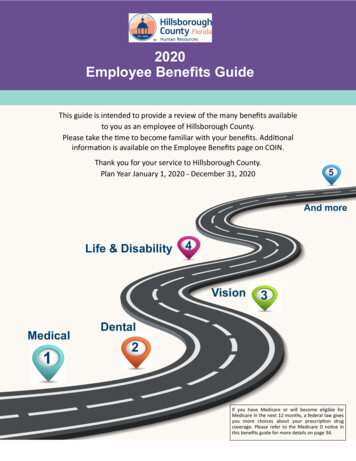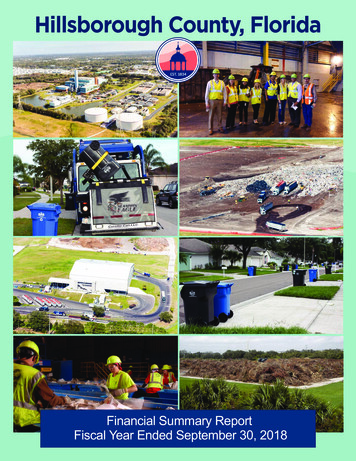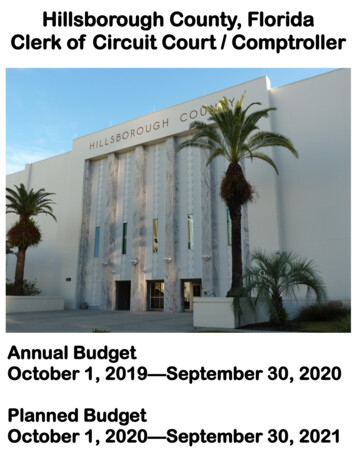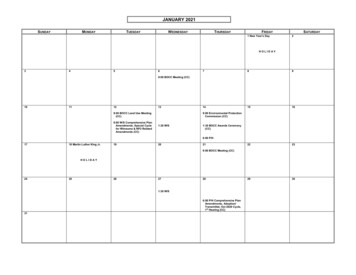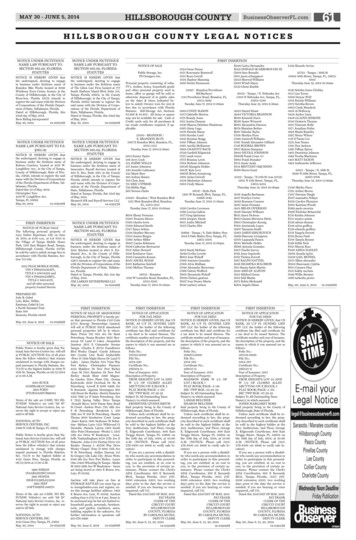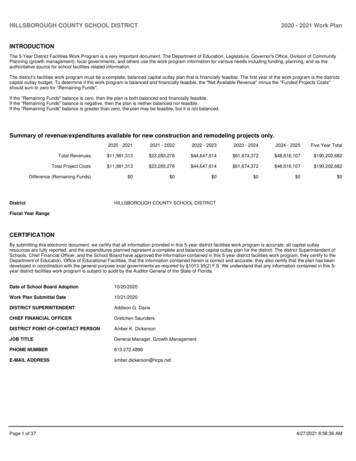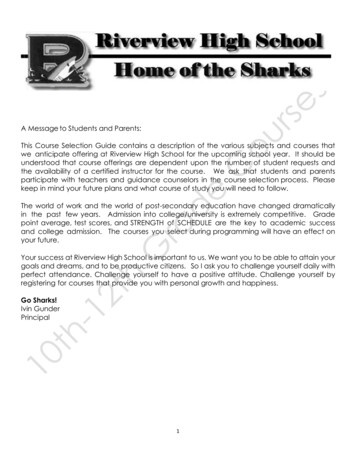
Transcription
A Message to Students and Parents:This Course Selection Guide contains a description of the various subjects and courses thatwe anticipate offering at Riverview High School for the upcoming school year. It should beunderstood that course offerings are dependent upon the number of student requests andthe availability of a certified instructor for the course. We ask that students and parentsparticipate with teachers and guidance counselors in the course selection process. Pleasekeep in mind your future plans and what course of study you will need to follow.The world of work and the world of post-secondary education have changed dramaticallyin the past few years. Admission into college/university is extremely competitive. Gradepoint average, test scores, and STRENGTH of SCHEDULE are the key to academic successand college admission. The courses you select during programming will have an effect onyour future.Your success at Riverview High School is important to us. We want you to be able to attain yourgoals and dreams, and to be productive citizens. So I ask you to challenge yourself daily withperfect attendance. Challenge yourself to have a positive attitude. Challenge yourself byregistering for courses that provide you with personal growth and happiness.Go Sharks!Ivin GunderPrincipal1
10th – 12th GradeCOURSE SELECTIONGUIDE2019-2020ADMINISTRATIVE STAFFPrincipal:Ivin GunderAssistant Principal for Curriculum (APC):Jennifer Canady, Ph.D.Responsible for the total operation of the school.Responsible for managing the academic affairs of the school.Matters related to course offerings, academic policies andprocedures, and student performance can be addressed to theAPC.Assistant Principal for Administration(APA): Kevin MassenaResponsible for managing the activities and business affairs ofthe school. Matters related to clubs, organizations, athletics,fundraisers, and the school facility should be addressed to theAPA.Assistant Principals for Student Affairs(APSA):Eric Scott, 9th & 12thYolanda Dickey, 11th & 12thDavid Kovacs, 10th & 12thResponsible for student discipline, attendance, health,homebound services, free and reduced lunch availability,lockers, and other matters related to the well-being of thestudent. Students are assigned to their APSA by the first letter oftheir last name.School Counselor Dept. Head:Dr. Alyndria Miller, M-O, Rivera-RossResponsible for providing educational and personal guidanceto students. Counselors assist students with developing theirIndividual Career Plans and select courses to attain personalgoals. Students are assigned to guidance counselors by the firstletter of their last name.School Counselors:Carlisia Shepherd, A-Com, PPerryMelissa Caryer, Con-G,Perryman-RamarBrian Bowman, H-L,Ramdass-RivardAlyndria Miller, M-O,Rivera-RossLouise Fernandez, Se-Z,Rossi-Se2
College & Career Counselor:David ElkinsAssists students with college planning coordinatesscholarships, and post- secondary institution/collegevisits.3
DUAL ENROLLMENTThe Dual Enrollment Program is designed for students pursuing a college-preparatory courseof study in high school. Dual enrollment courses are applicable to the Associate in Artsdegree at Hillsborough Community College (HCC). Students and parents should make thedecision to enroll in dual enrollment courses based on communication with the university thestudent will attend. Some schools do not accept dual enrollment credits. Other schools onlygive elective credit. Some schools award no credit because these classes are not applicableto the degree requirements. Dual Enrollment course offerings frequently change. The courseslisted below will be offered if an HCC instructor is available. Additional courses may beoffered. Students should indicate an academic alternate on their programming sheet incase their chosen Dual Enrollment class is unavailable. Dual enrollment classes areweighted the same as Advanced Placement classes at .08 higher than regular classes. Dualenrollment classes can enhance a student’s GPA.Dual Enrollment classes are offered at HCC and at Riverview. If you plan to take DualEnrollment classes next year, you’ll still sign up for a full class load during programming so thatyou have reserved a spot in Honors or AP in case you don’t get the Dual Enrollment class. Ifyou qualify to take Dual Enrollment classes, there will be additional paperwork that you willcomplete at Riverview and an online application that you will do for HCC. Since we have noguarantees of availability, we will edit your class choices for next year based on which DualEnrollment classes you’re able to take.All information on available courses, times, paperwork and deadlines is available on the HCCwebsite. rollment.aspx, or search for“Dual Enrollment on the HCC site.)Information on Riverview Dual Enrollment courses will be available in Guidance and on Edlineonce those classes are approved by HCC. All classes are contingent on the availability ofinstructors and HCC approval, and dates and times can change on short notice.Student Eligibility Criteria for Dual Enrollment Courses:1. The Board shall identify the students qualified for participation in the program. For moreinformation visit the HCC website at llment.aspx. These students must demonstrate academic capabilities to pursuecollege level instruction.2. In order to be eligible for participation in the program a student must:a. have at least a 3.0 cumulative grade point average (un-weighted); andb. be pursuing a college preparatory course of study for enrollment in universitytransfer courses or be seeking a degree or certificate for enrollment in technicalcourses.c. take the ACT, SAT or Postsecondary Educational Readiness Test (PERT). Minimumtest scores required by HCC are as follows:d . PERT - Reading 104, Writing 99, Math 123SAT - Critical Reading/Verbal 440, Math 440ACT - Reading 18, Writing 17, Math 21e. Students must bring proof of passing test scores to their counselors prior to4
programming. Students who have not yet received passing test scores areurged to take the PERT at the HCC campus prior to programming and have anappropriate score.3. Students may take no more than 9 credit hours during any one semester (18 weeks).4. The high school principal or his/her designee will approve students eligible for DualEnrollment.5. Students will be considered high school students for the purpose of student activitiesand student body privileges.5
DUAL ENROLLMENT COURSE OFFERINGSCOLLEGE SUCCESSGrades 10-121/2 Credit; 18-week ClassStudents must have a minimum un-weighted GPA of 3.0 but do not need test scores for thisclass. This interdisciplinary course empowers students by preparing them for a successfulcollege experience and providing them with additional opportunities to develop intellectualpotential and life skills. It enhances student understanding of library resources, studentservices, and other areas of academic support. Topics include goal assessment, timemanagement, power reading, creative and critical thinking, test-taking, memory, notetaking, communication skills, study techniques, and interpersonal relationship issues.FRESHMAN COMPOSITION SKILLS 1Grade 12 ONLY1 Credit; 18-week ClassThis class meets the requirement for English I. Students must have a 3.0 un-weighted GPA andacceptable scores in ACT Reading and English, SAT Critical Reading, and PERT Reading andSentence Skills. Freshman Composition Skills 2 may also be available for second semester.ADVANCED PLACEMENTParents and students wanting more details on topics covered in any Advanced c/public/courses/descriptions/index.htmlLANGUAGE ARTSAP ENGLISH LANGUAGE AND COMPOSITIONGrade 111 creditAdvanced Placement Language and Composition is the equivalent of a first-year collegecomposition course. The coursework in this year-long class is challenging and academicallyrigorous. This course requires a high level of commitment from the student in both effort andtime, but the rewards are great. Taking this class is perhaps the most important step astudent can make in preparing for the challenges of college writing. Students must takethe Advanced Placement test for English Language and Composition in the spring with ascore of 3 or better in order to receive college credit.AP ENGLISH LITERATURE AND COMPOSITIONGrade 121 creditPrerequisite: Ability to handle a high-level literature course.Advanced Placement Literature and Composition is the equivalent of a first-year collegeliterature course. The course work in this year-long class is challenging and academicallyrigorous. This course requires a high level of commitment from the student in both effort andtime. Students will study literature from the 16th century to contemporary times andinterpret structure, style, themes and literacy elements. Students must take the AdvancedPlacement test for English Language and Composition in the spring with a score of 3 or betterin order to receive college credit. Students who have previously taken Advanced PlacementLanguage and Composition will find this class an excellent progression.6
MATHEMATICSAP STATISTICSGrade 11-121 creditPrerequisite: Algebra II Honors or HigherA TI-83 or TI-84 graphing calculator is requiredThe purpose of this course is to introduce students to the major concepts and tools forcollecting, analyzing, and drawing conclusions from data. Topics include exploratory analysis,planning a study, anticipating pattern, and statistical inference. It is required that the studenttake the Advanced Placement Examination in Statistics.AP CALCULUS ABGrade 11-121 creditPrerequisite: Analysis of Function, “C” or better.A TI-84 or TI-89 graphing calculator is requiredThe purpose of this course is to offer college level mathematics under the guidelines of theAdvanced Placement Program. The course content will follow the outline set forth by theCollege Board for Advanced Placement, AB course. The following list is a set of specific courseobjectives. The list is organized with respect to its major course topics which include a reviewof the prerequisites, the development of limits, Differentiation, Integration, TranscendentalFunctions, Special Techniques/Methods, and the application of these topics.AP COMPUTER SCIENCE PRINCIPLES1 creditGrade 10-12The new AP Computer Science Principles course will complement AP Computer Science as itaims to broaden participation in the study of computer science. The courses underscore theimportance of communicating solutions appropriately and in ways that are relevant tocurrent societal needs. AP Computer Science courses can help address traditional issues ofequity, access, and broadening participation in computing while providing a strong andengaging introduction to fundamental areas of the discipline.AP COMPUTER SCIENCE AGRADE 9-121CREDITThe goals of the AP Computer Science A course are comparable to those in the introductorycourse for computer science majors offered in many college and university computerscience departments. It is not expected that all students in the AP Computer Science Acourse will major in computer science at the university level. The AP Computer Science Acourse is intended to serve both as an introductory course for computer science majors andas a course for people who will major in other disciplines and want to be informed citizens intoday’s technological society.SAP ENVIRONMENTAL SCIENCEGrade 10-12Prerequisite: Biology, Chemistry Honors, Algebra II71 credit
The purpose of this course is to provide students with a college level course in environmentalscience and to prepare the student to seek credit and/or appropriate placement in collegebiological science programs. The content should include, but not be limited to, the studyof the biosphere, its biotic and abiotic components; ecosystems of the world; bio-geologiccycles; and current environmental issues. Specific laboratory activities are courserequirements.All students enrolled in APES are REQUIRED to take the National APESexamination for that year.AP BIOLOGYGrade 10-121 creditCo-requisite: BIOLOGY II HONORSGrade 10-121 creditPrerequisites: Biology, Chemistry HonorsThe purpose of this course is to provide a college level course in the biological science and toprepare the student to seek credit and/or appropriate placement in college biology courses.The content should include, but not be limited to, molecular and cellular biology, organismalbiology, and populational biology. Opportunities to understand the interactions of science withtechnology and society should be provided. Specific laboratory activities are courserequirements. All students enrolled in AP Biology are REQUIRED to take the national AP BiologyExamination for that year.AP CHEMISTRYGrade 10-121 creditCHEMISTRY II HONORS (Co-requisite)Grade 10-121 creditPrerequisite: Biology and Chemistry HonorsThe purpose of this course is to provide a college level course in chemistry and toprepare the student to seek credit and/or appropriate placement in college chemistrycourses. The content should include, but not be limited to, structure of matter, states ofmatter, chemical reactions, and descriptive chemistry. Opportunities to understand theinteractions of science with technology and society should be provided. All students enrolledin AP Chemistry are REQUIRED to take the National AP chemistry examination for that year.AP PHYSICSGrade 11-121 creditPrerequisite: Physics Honors, Grade of “B” or higher in Advanced Topics orTrigonometry/Analytic Geometry (Math)The purpose of this course is to provide a college level course in physics and to preparethe student to seek credit and/or appropriate placement in college physics courses. Thecontent should include, but not be limited to, kinematics, Newton’s laws of motion,conservation laws; classical mechanics, torque, rotational equilibrium, gravitation, oscillation,kinetic theory, thermodynamics, electrostatics, electric currents, magnetism, waves andoptics, modern physics. All students enrolled in AP Physics are REQUIRED to take the NationalAP Physics examination for that year.8
SOCIAL STUDIESAP MACROECONOMICSGrade 10-121 credit1stsemesterAP Macroeconomics is an introductory college-level course that focuses on the principlesthat apply to an economic system as a whole. The course places particular emphasis on thestudy of national income and price-level determination; it also develops students’ familiaritywith economic performance measures, the financial sector, stabilization policies, economicgrowth, and international economics. Students learn to use graphs, charts, and data toanalyze, describe, and explain economic concepts.AP MICROECONOMCSGrade 10-121 credit2ndsemesterAP Microeconomics is an introductory college-level course that focuses on the principles ofeconomics that apply to the functions of individual economic decision-makers. The coursealso develops students’ familiarity with the operation of product and factor markets,distributions of income, market failure, and the role of government in promoting greaterefficiency and equity in the economy. Students learn to use graphs, charts, and data toanalyze, describe, and explain economic concepts.AP HUMAN GEOGRAPHYGrade 11-121 creditRequirement: Minimum FCAT Reading Level 3AP Human Geography is about how humans have affected the landscape. Topics includeculture, population, agriculture, urbanization, and political geography.AP EUROPEAN HISTORYGrade 121 creditPrerequisites:AP World History, AP American History, Teacher Recommendation: APUSH& AP Lang/Eng 3 HonorsAP European History is a college prep course that provides students with an academicexperience equivalent to a freshman/sophomore college survey of western history. The courseis specifically designed to provide students with an in-depth study of European history from the15th century through the modern day. In addition to course content, AP European History isintended to enhance development of student critical thinking, document analysis, interpretivereading, information organization, synthesis, and writing skills. Students successfully masteringthe course material may earn college credit by passing the annually administered APEuropean History exam; the individual college or university determines how many, or if, anycredits will be granted for the AP exam score.AP UNITED STATES HISTORY1 creditGrade 10-12AP United States History focuses on developing students’ abilities to think conceptually aboutU.S. history from approximately 1491 to the present and apply historical thinking skills as theylearn about the past. Seven themes of equal importance — identity; peopling; politics and9
power; work, exchange, and technology; America in the world; environment and geography;and ideas, beliefs, and culture — provide areas of historical inquiry for investigation throughoutthe course. These require students to reason historically about continuity and change overtime and make comparisons among various historical developments in different times andplaces.AP WORLD HISTORYcreditGrade 10-121AP World History focuses on developing students’ abilities to think conceptually about worldhistory from approximately 8000 BCE to the present and apply historical thinking skills as theylearn about the past. Five themes of equal importance — focusing on the environment,cultures, state-building, economic systems, and social structures — provide areas of historicalinquiry for investigation throughout the course. AP World History encompasses the history ofthe five major geographical regions of the globe: Africa, the Americas, Asia, Europe, andOceania, with special focus on historical developments and processes that cross multipleregions.AP PSYCHOLOGYGrade 10-121 creditThis course is designed to introduce students to the systematic and scientific study of thebehavior and mental processes of human beings and other animals. Students are exposed tothe psychological facts, principles, and phenomena associated with each of the majorsubfields within psychology. They also learn about the ethics and methods that psychologistsuse in their science and practice. AP Psychology is a secondary school equivalent to anintroductory college course in psychology.AP US GOVERNMENT & POLITICSGrade 12½ creditRequirements:Minimum FCAT Reading Level 3 and teacher’s recommendation: APUSH,AP World History, World History Honors, AP Lang/Eng 3 HonorsAP US Government is a 1 semester course paired with dual enrollment European History. It isintended for high- achieving seniors.ARTSAP ART HISTORYGrade 11-121 creditAP Art History engages students at the same level as an introductory college art historycourse. This involves critical thinking and writing and should develop students understandingand knowledge of diverse historical and cultural contexts of architecture, sculpture, paintingand other media. In this course, students examine and critically analyze major forms ofartistic expression from the past and the present from a variety of cultures. While visualanalysis is a fundamental tool of the art historian, AP Art History also emphasizesunderstanding of how and why works of art function in a global context, considering suchissues as religion, politics, patronage, gender, and the functions and effects of works of Art.10
Many colleges and universities offer advanced placement and/or credit to students whoperform successfully on the AP Art History Exam in Visual Arts and/or Humanities.AP DRAWINGGrade 11-121 creditStudents create a portfolio of work to demonstrate inquiry through art and design anddevelopment of materials, processes, and ideas over the course of a year. Portfolios includeworks of art and design, process documentation, and written information about the workpresented. In May, students submit portfolios for evaluation based
DUAL ENROLLMENT The Dual Enrollment Program is designed for students pursuing a college-preparatory course of study in high school. Dual enrollment courses are applicable to the Associate in Arts degree at Hillsborough Community College (
